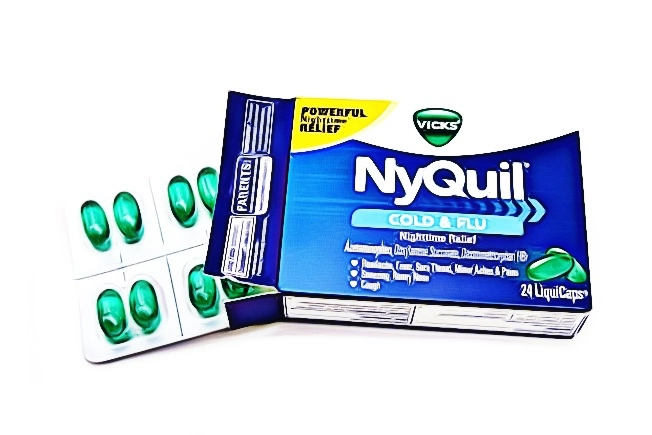One of the most popular over-the-counter medications for flu is NyQuil. Sold under the brand Vicks, people use it to treat allergies and the common cold at night. “NyQuil” is a portmanteau of “night” and “tranquil,” and one of the brand’s promises is that this medication will offset insomnia or wakefulness associated with the flu. Despite the benefits, though, many people hesitate to use it because it can cause addiction. Here are some frequently asked questions about NyQuil, answered.
How Long Does NyQuil Last?
All NyQuil formulations contain doxylamine succinate. This antihistamine functions as a competitive antagonist of the H1 histamine receptor. This histaminergic transmission produces a sedative effect and causes drowsiness in the patient. Although all NyQuil formulations have doxylamine, they differ in secondary ingredients. The different formulations ease specific symptoms; for example, there are doxylamine formulations that also address cough, while others alleviate pain, sinus blockages, and more. Common secondary ingredients include dextromethorphan, acetaminophen, pseudoephedrine, and phenylephrine.
Arguably, NyQuil is one of the most effective medications against the common cold and flu-related symptoms. It also helps countless people sleep better despite their ailment. However, it can also cause various side effects like brain fog, blurred vision, brain fog, drowsiness, and dizziness. It is also possible for patients to experience impaired motor skills and even next-day-cognitive impairment. As such, many individuals discontinue their use of NyQuil.

Once they stop taking the drug, many people wonder how long NyQuil will stay in their system. Even after the final dose, you can still experience side effects from NyQuil, which poses potential risks. With this drug in your system, you could be at risk for a motor vehicle accident or impaired performance at school or work. The presence of NyQuil might compromise your cognitive skills and impair your ability to operate machinery.
To figure out how long NyQuil stays in your system, you must consider its ingredients’ elimination half-lives. After ten hours, the body would have flushed out the secondary ingredients of the formulation. Doxylamine is the last to get removed from the circulation.
NyQuil might stay in the body longer or shorter than the average, though. The drug’s longevity in your system depends on several factors. Your age, body mass, metabolism, and dosage frequency all affect how long NyQuil will stay in circulation. If you co-administer it with other drugs, that is also a factor.
For instance, individuals above 65 years old exhibit lower hepatic function and less efficient physiologic functions. These age-related changes result in NyQuil requiring a more extended period of elimination. Long-term users with a higher BMI will also process NyQuil longer. Certain people are also genetically predisposed to processing doxylamine at a slower rate than the rest of the population. Other factors, like the level of alkalinity in a person’s urine, urinary flow rate, and overall renal functions, are also in play. In some individuals, particularly the elderly, it can remain for up to 15.5 hours in the body.
Whether it stays for a few hours or a couple of days, you will have to prepare for its side effects no matter what. Once you wake from a NyQuil-induced sleep, you’ll likely experience blurry vision and heavy eyes. It’s necessary to give yourself at least eight hours of sleep and avoid operating heavy machinery for at least eight hours after the dose.
Typically, you should no longer be experiencing side effects after ten hours. At this point, it is safe to resume your daily activities. Should you experience a hangover, or if the side effects worsen even after ten to 12 hours, you should immediately seek medical assistance.
What Are the Side Effects? What Is a NyQuil High?
Another thing people want to know is how long it takes for it to kick in. When you take it in liquid form, you will feel a warm sensation in your throat, and you will begin to feel positive effects after just ten minutes. Your aches will start to fade, and your eyelids will close on their own. For people taking a formulation containing dextromethorphan or DXM, it can also cause mind-altering side effects, also known as the “NyQuil high.”
Aside from DXM, NyQuil might also contain alcohol. Although this substance does cause you to fall asleep, it is far from healthy. Alcohol disrupts your sleep cycle and causes tiredness in the long run.
Typically, this drug causes drowsiness, dizziness, and blurred vision. Other side effects include having an upset stomach, nausea, nervousness, constipation, and a dry throat or nose. These mild side effects will go away on their own after a few days. If they do not, you should consult your physician.
- Apart from the short-term side effects, some people experience long-haul ones. Hallucinations, confusion, seizures, shaking, difficulty urinating, having an irregular heartbeat, and severe allergic reactions are all possible long-term side effects of NyQuil use. If any of these manifest, you should immediately seek your doctor’s advice.
What Is The NyQuil Hangover?
NyQuil helps people sleep better. In the morning, though, it might cause what people call the NyQuil hangover. People who experience it report feeling tired and drowsy during the day. Even if you slept for eight hours the night before, it wouldn’t be enough to remove its sedative effects. It’s best to let the medication run its course.

How Do People Develop An Addiction?
Doxylamine works by inducing sedative properties and targeting histamine receptors in the brain. If you read the packaging of your bottle of NyQuil, you’ll see that it comes with a warning not to use it for longer than ten days. If you do, you might find yourself dependent on the medication and experiencing withdrawal symptoms.
Using doxylamine as a sleep aid or for chronic conditions like asthma can cause dependence. Recreational or long-term use of the drug can also cause the user to build resistance to it. It means you will need higher amounts of the drug to reach the desired effects. When this happens, you become tolerant to the drug, which causes physical dependence and addiction.
A person experiencing addiction cannot stop destructive behaviors like constant drug use, despite their harmful effects. Addiction is a complex brain disorder that needs proper medical care and management. Entering alcohol and drug rehab can help people overcome their addictions.
NyQuil Ingredients
NyQuil’s active ingredients include acetaminophen, dextromethorphan, and doxylamine succinate. Acetaminophen is a pain reliever and antipyretic and helps reduce fever. Dextromethorphan is a cough suppressant, and doxylamine succinate treats allergies and blocks histamines.
Patients must follow the recommended NyQuil dosage since it can cause addiction. A NyQuil overdose can cause vomiting, loss of appetite, nausea, and abdominal pain. In some instances, it can even be fatal.
Conclusion
NyQuil is a potent over-the-counter medicine used in managing symptoms of the common cold and flu at night. However, it may yield unwanted side effects. It is also highly addictive. Although it is an OTC drug, patients should consult their doctor before using NyQuil since it has plenty of severe and long-term side effects. A person suffering from addiction can seek drug rehabilitation. Doing so will help them cope with the effects of NyQuil withdrawal.
Source:
https://www.drugabuse.gov/publications/drugfacts/over-counter-medicines
https://www.urmc.rochester.edu/encyclopedia/content.aspx?contenttypeid=1&contentid=2617




